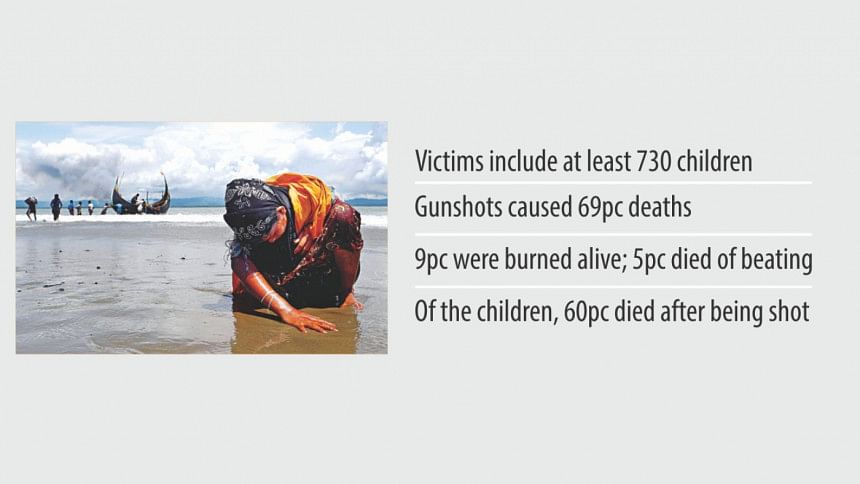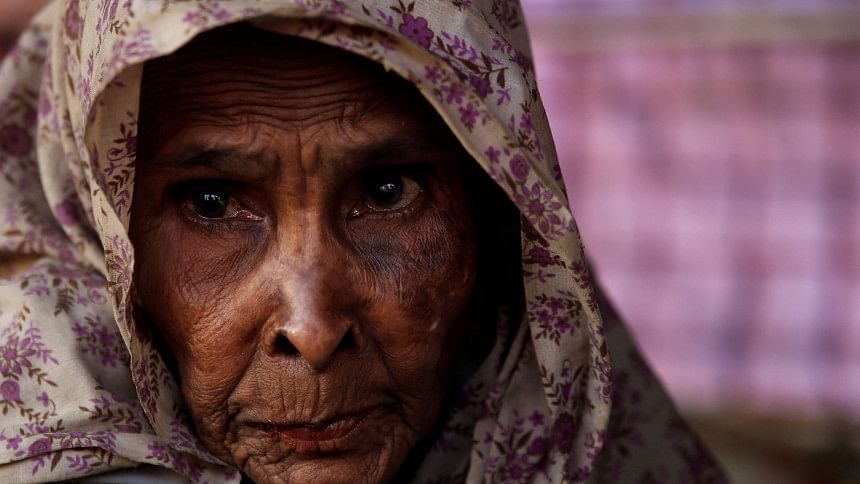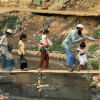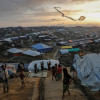Myanmar Army Crackdown: 6,700 Rohingyas killed in 1 month

At least 6,700 Rohingyas were killed in the first month of a Myanmar army crackdown on rebels in Rakhine State that began in late August, Doctors Without Borders (MSF) said yesterday.
The medical charity said the first major survey on the scale of mortality was the "clearest indication yet of the widespread violence" that began on August 25, which has driven some 647,000 Rohingyas across the border to Bangladesh.
Based on interviews at refugee settlements in Bangladesh's Cox's Bazar region, MSF estimated at least 6,700 Rohingyas -- including some 730 children below the age of five -- were killed by violence between August 25 and September 24.
The charity, also known as Doctors without Borders, said the figures were "the most conservative" estimates.
"At least 6,700 Rohingya, in the most conservative estimations, are estimated to have been killed, including at least 730 children below the age of five," MSF stated.
Its medical director Sidney Wong said, "We met and spoke with survivors of violence in Myanmar, who are now sheltering in overcrowded and unsanitary camps in Bangladesh.
"What we uncovered was staggering, both in terms of the numbers of people who reported a family member died as a result of violence, and the horrific ways in which they said they were killed or severely injured."
Gunshots were the cause of death in most cases. Others were beaten or burned to death in their houses.
"We heard reports of entire families who perished after they were locked inside their homes, while they were set alight," Wong said in a statement.
The army has put the official death toll at 400 people, including 376 Rohingya "terrorists", and cleared its troops of any abuses in an internal probe.
The government has also blocked a UN fact-finding team from accessing northern Rakhine state, despite global calls for a credible investigation.
Responding to MSF's findings, the charity Save the Children said it was appalled by the loss of life.
"The international community must work to end the violence, bring perpetrators to justice and insist on immediate, full and unfettered humanitarian access to all people in need in Rakhine state," Bangladesh director Mark Pierce said in a statement.
"Violence against children cannot be tolerated and cannot remain unpunished."
The figure is the highest estimated death toll yet of violence that erupted on August 25 and triggered a massive refugee crisis.

The group's findings come from six surveys of more than 11,426 people in Rohingya refugee camps and cover the first month after the crisis erupted.
Rohingya refugees have shocked the globe with consistent stories of security forces and ethnic Rakhine Buddhist mobs driving them out of their homes with bullets, rape and arson that reduced hundreds of villages to ash.
The UN and US have described the military operation as "ethnic cleansing" of the Muslim minority, but have not released specific death tolls. Last week, a top UN human rights official said last week that Myanmar's security forces may be guilty of genocide against the Rohingya.
'SHOCKING NUMBERS'
Gunshot wounds were the cause of death in 69 percent of the cases, according to the aid organisation.
Another nine percent were reported burned alive inside houses, while five percent died from fatal beatings.
For children under five, nearly 60 percent died after being shot, MSF found.
MSF said the peak in deaths coincided with the launch of "clearance operations" by the army and local militias in late August, and showed "that Rohingya have been targeted".
Myanmar's government did not respond to a request for comment.
But it has consistently denied committing atrocities in Rakhine, saying the crackdown was a proportionate response to the Rohingya militants who attacked police posts on August 25, killing around a dozen officials.
Richard Horsey, an independent political analyst based in Yangon, said the MSF estimates were "quite shocking" and would "inevitably lead to a renewed focus internationally on the question of accountability".
Before the latest crisis, Bangladesh was already hosting hundreds of thousands of Rohingya who fled previous waves of persecution.
"I think the MSF figure is an underestimate," Mohammad Zuabir, a Rohingya teacher and community leader who has been a refugee in Bangladesh for 25 years, told AFP.
"Almost every Rohingya family has one or multiple members killed in the violence. When people fled their villages in Rakhine, they saw roads and homes littered with dead bodies," he added.
[From AFP, Reuters]

 For all latest news, follow The Daily Star's Google News channel.
For all latest news, follow The Daily Star's Google News channel. 








Comments